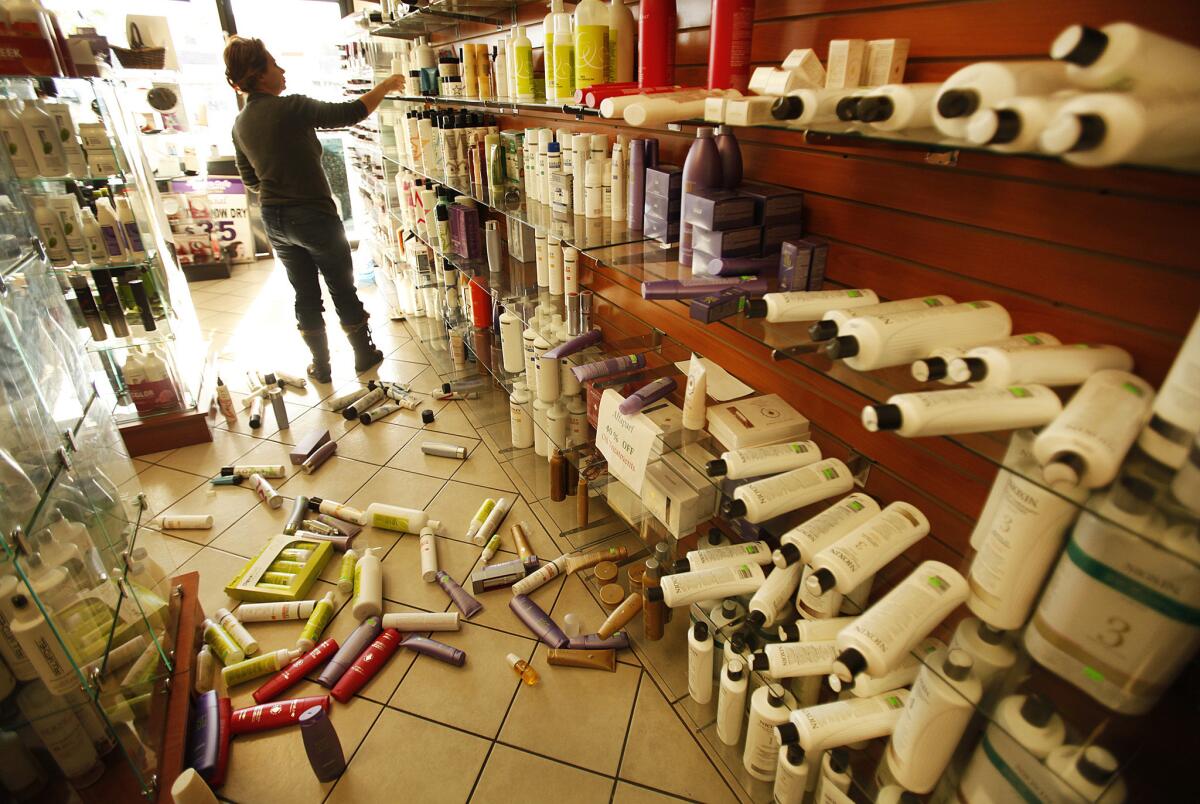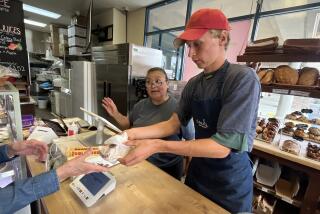Oil industry group: ‘Irresponsible’ to link L.A. quake, fracking

An oil and gas industry association blasted a push by several members of the Los Angeles City Council to investigate whether hydraulic fracturing and other forms of oil well stimulation played any role in the earthquake that rattled Los Angeles on Monday, calling the move “appallingly irresponsible.”
“It does not surprise us that the handful of extremist environmental organizations ... would attempt to make an entirely unfounded connection between hydraulic fracturing and the earthquake,” Western States Petroleum Assn. President Catherine Reheis-Boyd wrote in a Wednesday statement.
“But when three members of the Los Angeles City Council make similar statements, despite an overwhelming amount of scientific and other evidence that contradicts their assertions, it is time for responsible leaders to say, ‘Enough,’” Reheis-Boyd wrote. The trade group president stated that hydraulic fracturing, often referred to as fracking, “had nothing to do with” the Monday quake.
A motion presented Tuesday by Councilmen Paul Koretz and Mike Bonin and seconded by Councilman Bernard C. Parks asks for city departments to team up with the U.S. Geological Survey and other government agencies to report on whether fracking, acidizing and other well stimulation techniques contributed to the magnitude 4.4 quake.
“All high-pressure fracking and injection creates ‘seismic events’ .... It is crucial to the health and safety of the city’s residents to understand the seismic impacts of oil and gas extraction activities in the city,” the motion stated.
Two experts from the USGS told The Times that the Monday quake under the Santa Monica Mountains appeared to be deeper than is typical for earthquakes induced by oil or gas production activities.
Fracking or wastewater injection “would be unlikely to produce an earthquake that deep,” said USGS geophysicist Art McGarr, who manages a project on induced earthquakes. “I think the likelihood that there’s any kind of connection is really small.”
Seismologist Lucy Jones, a USGS science advisor for risk reduction, said Tuesday that she would need to know much more about pumping in the area to assess whether it could have been a factor.
However, “my first impression is that sounds implausible” because of the depth of the Monday quake, Jones said Tuesday.
Earlier this year, Koretz and Bonin championed a proposal to ban fracking in Los Angeles until the council is assured that Angelenos and their water supplies were safe from its effects. Earthquake risks are one of the hazards that the two have warned of, echoing the concerns of environmental groups that the methods can trigger earthquakes when wastewater is injected back underground.
A recently released report by Earthworks, the Center for Biological Diversity and Clean Water Action argued that “oil industry wastewater disposal poses unacceptable risks” in California in light of “the link between wastewater injection wells and earthquakes in other states.”
In recent years, a string of quakes have occurred in areas not normally prone to them, including Oklahoma and Colorado, many near such injection wells, according to the USGS. In a discussion of induced earthquakes it states that “although wastewater injection has not yet been linked to large earthquakes ... scientists cannot eliminate the possibility.”
McGarr said that though he was skeptical that the Monday quake in Los Angeles was linked to oil or gas production, “the evidence is quite strong” that wastewater injection has affected seismic activity, especially in areas such as Oklahoma, which has undergone “a dramatic increase in seismicity.”
The proposal from Koretz and Bonin is headed to a council committee focused on public safety. It asks city departments to work with the USGS, the California Division of Oil, Gas and Geothermal Resources and the South Coast Air Quality Management District on the proposed report.
Twitter: @latimesemily
More to Read
Sign up for Essential California
The most important California stories and recommendations in your inbox every morning.
You may occasionally receive promotional content from the Los Angeles Times.











